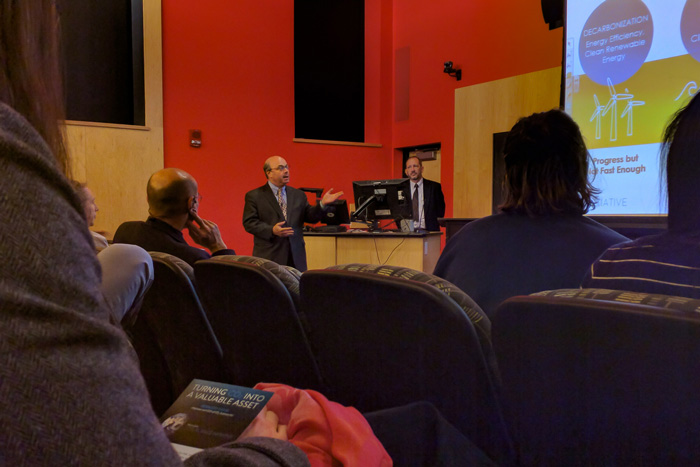Extracting Optimism

Bernard David P'13 was recently on campus to give a lecture, "Turning CO2 Into a Valuable Asset." Photo by Tony Moore.
Bernard David P’13 is on a quest to capture 10 percent of the world’s CO2
by Tony Moore
First the bad news: Across the globe, the acceleration of CO2 emissions continues unabated, now averaging 35 gigatons per year, and climate change is marching on.
Now some good news: That CO2 actually can be captured and removed from the climate-change picture and used to make more than 25 industrial products—everything from cement to fuel to chemicals. Leading the charge on this extraction movement is Bernard David, the father of Emily David ’13, recently on campus to deliver a lecture on what he sees as a big step in making a difference.
“He’s either a crazy man or working on the next big thing,” said Neil Leary, director of the Center for Sustainability Education (CSE), in his introduction. “His plan is ambitious and audacious.”
David’s visit was sponsored by CSE and the departments of international business & management, earth sciences and environmental studies. Over the course of the hour in Althouse Hall, David discussed the Global CO2 Initiative, an organization he founded earlier this year that seeks to commercialize the carbon-capture movement, thereby drawing the attention, innovation and funding of corporations and investors. Once innovation catches up with David’s ambition, he hopes to open up the estimated $800 billion to $1.1 trillion carbon-based market that the process can create by 2030, while removing a targeted 10 percent of CO2 from the atmosphere.
“In an ideal world, we wouldn’t need to be doing this, because we’d be on all renewable energy,” said David, a Fellow of the Wharton School’s Initiative on Global Environmental Leadership and former advisor to the U.S. Environmental Protection Agency. “But I’ve never been so optimistic in my lifetime, in this area.”
The Global CO2 Initiative will serve as a research and development hub, soliciting proposals from around the world and funding those showing the most promise. It’s a mission that David sees as vital, now more than ever.
“If you can’t stop climate change, you have to figure out how to adapt,” he said. “And we need to figure this out yesterday, because time is not our friend with this one.”
Learn more
- Global CO2 Initiative
- Center for Sustainability Education
- Department of Earth Sciences
- Department of Environmental Studies & Environmental Science
- Department of International Business & Management
- Latest News
Published May 3, 2016